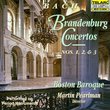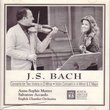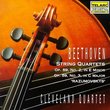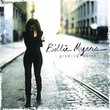| All Artists: Tallis Scholars, Peter Phillips Title: Josquin: Missa Malheur me bat and Missa Fortuna desperata Members Wishing: 1 Total Copies: 0 Label: GIMELL Original Release Date: 1/1/2009 Re-Release Date: 3/10/2009 Album Type: Import Genre: Classical Styles: Opera & Classical Vocal, Historical Periods, Early Music Number of Discs: 1 SwapaCD Credits: 1 UPC: 755138104228 |
Search - Tallis Scholars, Peter Phillips :: Josquin: Missa Malheur me bat and Missa Fortuna desperata
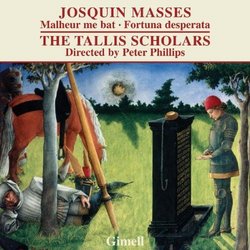 | Tallis Scholars, Peter Phillips Josquin: Missa Malheur me bat and Missa Fortuna desperata Genre: Classical |
Larger Image |
CD DetailsSimilarly Requested CDs
|
CD ReviewsA Triumph for the Tallis Scholars Giordano Bruno | Wherever I am, I am. | 03/10/2009 (5 out of 5 stars) "Josquin Desprez (1440-1521) was not an especially prolific composer, considering that he lived to the age of 80. There are sixteen masses unquestionably attributed to him, perhaps 100 motets and a few dozen chansons, and possibly only a single instrumental bassa danza on La Spagna. After his death, of course, an industry grew up of passing off any available music as a work by the Great Josquin, and musicologists are still battling over such attributions. Nobody quibbles, I think, over the assertion that the masses are Josquin's most profound and impressive masterpieces.
Of those masses, the majority are 'parody' compositions. The term 'parody' has a special meaning for Renaissance musicians. A parody mass is a composition that uses melodic material from an earlier work, often a secular chanson, as the inspiration and/or framework for some or all of the movements of the mass. Sometimes the chanson melody would be concealed almost subliminally in the long notes of the 'tenor' voice, essentially providing a series of chords. Sometimes the melody in long notes might be assigned to each of the voices in rotating turns. Other composers expressed the familiar melody more openly, setting the mass text to it unmistakably. Once I myself composed a parody Kyrie, using the cowboy song "Happy Trails to You," as a teaching device for a workshop in Renaissance music. If you remember that melody, you can sing "kyrie eleison" to it for yourself. I wanted to see if the students would detect the tenor melody within the polyphony, since modern listeners tend to focus their attention on the upper voices too exclusively. Only one of a dozen students spotted my little trick in the first read-through, a teenager from Los Angeles ... but that teenager was Doron Sherwin, the cornettist. The two masses on this CD are both based on songs that would have been known to every musician of Josquin's milieu, and one should grasp the fact that nearly everyone who might have heard such music was a musician himself/herself. There were no mere listeners, no fans, in the courts and chapels of the Renaissance. Both songs were recycled as parody masses; as chansons in two, three, four, up to seven voices; and as the basis for instrumental improvisations. The text to Malheur Me Bat has not survived, but the title implies a lament, most likely over unrequited love. Fortuna Desperata basically just means "bad luck." A Renaissance singer or instrumentalist would have paid close attention to something else besides the words; Malheur is a melody in the Phrygian mode (E to e on the white keys), a somber mode with many compositional challenges, hard to use for improvisation. Fortuna is in the Ionian mode, the modern C major or F major scale, considered the 'sunniest' of the modes, and the easiest for improvisation on diatonically tuned instruments, especially the wind instruments. The masses of Josquin's era were not intended to be performed straight through for an audience -- not even for a seated congregation in a church. They would have been interspersed with liturgical chants and readings, and often with other compositions, motets chiefly. Modern performances of such masses sometimes try to present them more authentically by including such interruptions of chant and motet, and often this is a wise decision since the masses may sound repetitive or meandering sung as if they were a symphony in five movements. Josquin's Missa Malheur Me Bat is anything but meandering. I wouldn't be so rash as to claim that Josquin foresaw a future when people would willingly sit and listen to his music for its own sake, but this mass is remarkably unified and developmental. The Malheur melody is prominent throughout, but with ever more complex and affective contrapuntal expressions. Note the progression of times assigned to the usual five elements of the mass. Because it has the most text, the Credo is often the longest section, making the Sanctus and Agnus Dei anticlimactic. Josquin, however, stretches each section into deeper expressivity and complexity: Kyrie, 3:42, Gloria 6:00, Credo 8:24, Sanctus 10:37, triple Agnus Dei 11:03, using the times from this Tallis Scholars performance. This is a mass that builds and builds for the listener, reaching intense poignancy in its final minutes. The Tallis Scholars have not been my favorite vocal ensemble in recent years. I have looked forward to this new CD from them as an opportunity to compare their efforts with the very fine performance of the same Missa Malheur Me Bat by The Clerks' Group, whose earlier recordings of Josquin and Ockeghem have been surpassingly excellent. Imagine my surprise then! This performance of Malheur by The Tallis Scholars is the best singing they've ever done of a "Franco-Flemish" mass, rhythmically more incisive, much better balanced between upper and lower voices, much more insightfully conducted and more transparent in its polyphonic distribution of interest, serenely 'moving' as it flows toward a real sense of completion in the Agnus Dei. It's as least as good as The Clerks' Group recording. I may grudgingly say, even better. The Missa Fortuna Desperata is sung just as sweetly, with excellent vocal balance and fine clear vocal timbres, but it's less successful as a whole. I think conductor Peter Phillips has misconceived it by trying to make it as blissfully poignant as the Malheur mass. In other words, he takes it too slow. "Fortuna Desperata" was widely used by 'alta capella' wind bands - shawms and trombones - and such bands were not paid to sound plaintive. The part writing in Josquin's mass sounds to me clearly influenced by instrumental styles, in its jagged leaping movements and polyrhythmic effects of prolations in separate parts and its frequent hemiolas (twos against threes). Josquin demonstrated his mastery of that style in his one wild La Spagna setting; he would not have been the only 'elite' church composer to incorporate such influences in his most serious 'educated' compositions. As I already mentioned, Fortuna is a melody in the most joyful of modes, and the irony of a morose love-text being set to jolly dance rhythms would not have been strange to the Renaissance mentality. Etc. etc. As a person who knows this repertoire rather well, I'd be ready to wager that this mass would be more effective if sung more playfully, at faster tempi throughout. Congratulations, in any case, to The Tallis Scholars for releasing their finest CD in many years. Forgive me, dear readers, but this has to be my second "must buy" recommendation for the month of March 2009, on a day when the news is that the stock market has rebounded!" |




